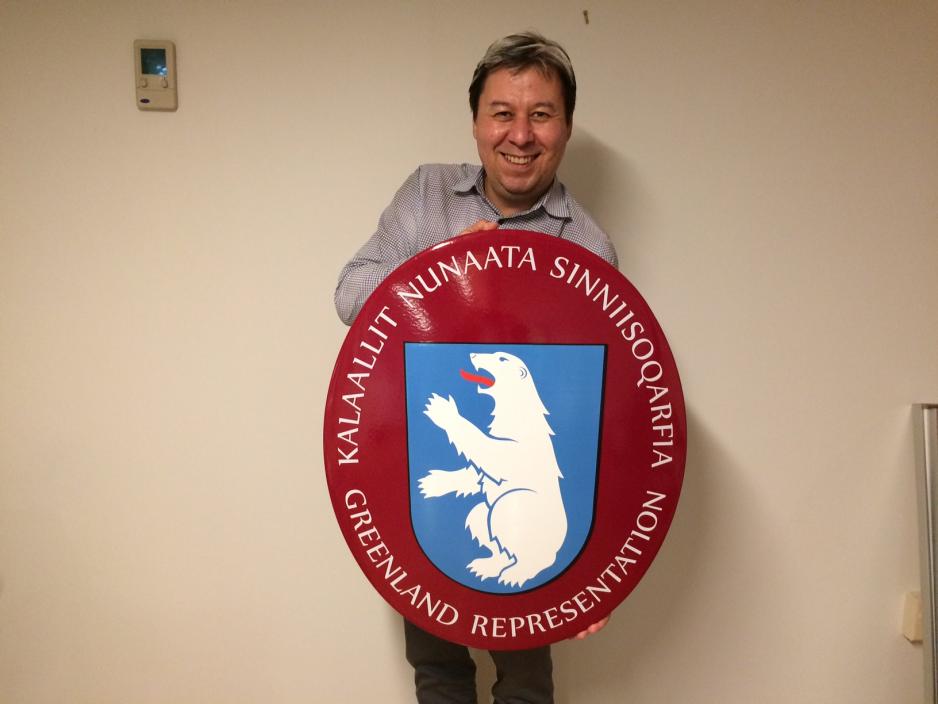Greenland´s man in Washington: Dirty laundry? Only in Copenhagen

Washington D.C: Walk far enough into the Danish Embassy in Washington, and you will see a large red coat-of-arms shield featuring a grumpy polar bear. Below the bear paws it says "Greenland Representation", and in the offices nearby sit Minister Inuuteq Holm Olsen and First Secretary Rebecca Lynge. They are Greenland’s eyes, ears and voice in the United States and Canada, and make sure Greenland is at the table when major political decisions are taken.
Inuuteq Holm Olsen knows the political as well as the Arctic United States well. At the age of twenty, he was selected as one of three Greenlanders to continue his education at University of Alaska in Fairbanks. After finishing his degree, he went on to graduate studies at the George Washington University in Washington, only a few blocks away from his current office.
In the years in between, he has had an impressive career as private secretary to the Greenland premier, Deputy Minister and Brussels representative. His current portfolio as Greenland Representative to the United States and Canada includes economic cooperation, foreign policy and security matters.
- When the Self-Rule Act for Greenland was enacted in 2009, we saw the need for more representation abroad. The Washington office was established in 2014. It was not without controversy, and there was some "political fuss" by those who saw this as another step towards independence. I coordinate my work through the Greenland authorities, but my employer is the Ministry of Foreign Affairs in Copenhagen, says Holm Olsen.
He works closely with the rest of the Embassy to reach the desired outcomes on issues important to Greenland.
- When we discuss difficult topics with the Americans, the Ambassador and I are both at the table, he says.
And the U.S.-Greenland relationship is not without its challenges. One example is the agreement regarding service contracts at the Thule military base, where American companies have been awarded contracts Greenland believes should be given to local companies, as per the original agreement. Greenland demands renegotiations and compensation, but so far American authorities have been unwilling to discuss the matter.
- Under president Obama, we never got as far as to real negotiations. And since Trump came to power, the matter has been frozen. In the State Department and Pentagon, the relevant positions have yet to be filled. Until that happens, we cannot make progress on this issue, says Holm Olsen.
China’s increasing interest in Greenland is also a complicating factor in US.-Greenland relations. China cooperates with Greenland on business, research and education, and Chinese investors are eager to expand their Greenland holdings.
Last year, a Chinese investor tried to buy an abandoned marine base, but according to the Danish newspaper Politiken, the Danish Prime Minister put his foot down and made sure the base remained on Danish hands, to avoid jeopardizing the alliance with the United States. However, Holm Olsen makes clear that Greenland welcomes Chinese investment:
- Greenland is heading into a new age and a new reality. We must diversify, and need to expand our economic cooperation with China as well as the United States and other countries. We do not see any problem with Chinese investment as long as it takes place within the existing rules, Holm Olsen emphasizes.
- Denmark and China have close ties. It is a misnomer to complain about the Greenlandic ties. China is an important market for us, especially for minerals and mineral processing, says Holm Olsen, and adds that a key part of his job is to attract new investment to Greenland from the United States.
- We must improve living conditions in the Arctic. We can only do that if we expand economic activity. Service industries, construction, mineral industry, environmental work – we need all of this, he says, and points to Maine as an example of a region in the process of positioning itself for becoming an economic hub in future Arctic development.
While it may be difficult to get American officials to return phone calls about Thule, it may become easier on other security policy issues. Renewed focus on the need for a stronger missile defense, as well as the need for more surveillance of Russian submarine traffic in the GIUK area (ocean between Greenland, Iceland and the UK) may make Greenland an increasingly important piece of the security picture in the north.
- So much depends on how U.S.-Russia relations develop. The Arctic has so far been a zone of peace, but we have to be realistic and pay attention. We work closely with other Arctic nations to increase awareness of Arctic policy in the United States, says Holm Olsen.
Well aware of the complexity of some of these issues, it is tempting to ask what happens at the Embassy when Nuuk and Copenhagen have differing views. Not unexpectedly, Holm Olsen has no wish to go there. He cuts that line of questioning short:
- At the Embassy, we work together. We air our dirty laundry in Copenhagen, he says with a disarming smile.
We try another one:
- What about the new President, has he made the Embassy’s work more difficult? Greenland’s top diplomat is ready for the question. He ends the interview with a diplomatic answer – one that would hold true for many people in Washington these days:
- The only thing I can say for sure is that he has made our job more unpredictable.
